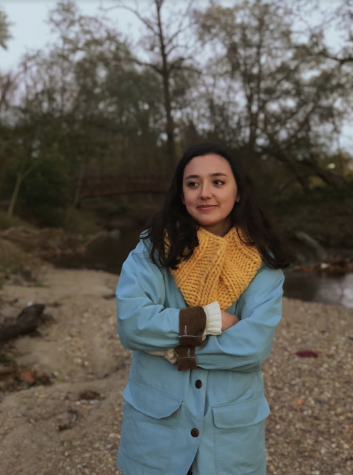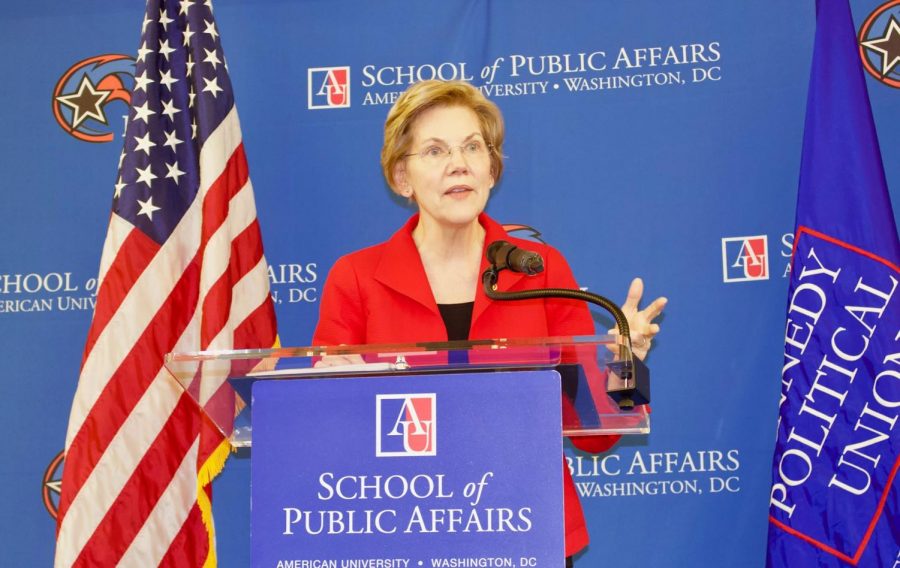Has the 2020 Campaign Trail Already Begun? : Elizabeth Warren comes to AU and talks foreign policy
“I hope she runs for president in 2020,” exclaimed freshman Jenna Whitaker as the crowded auditorium cleared out following a foreign policy address by Sen. Elizabeth Warren on Thursday, November 29, 2018.
The air in the room was electric. Nearly 450 AU and Washington College of Law students came to listen to the senior Massachusetts senator call for a new progressive American foreign policy. The speech drew attention from the national media, with many major DC news outlets in attendance.
This high-profile speech on foreign policy led observers to ask the question: is this the start of the 2020 campaign trail? When asked about this by Vicky Wilkins, Dean of the School of Public Affairs, Warren didn’t offer a verbal response, but her expression sent the crowd into a flurry of applause.
The speech differed from Warren’s usual policy focus. Typically, she is a domestic policy focus, and her platform focuses heavily on promoting economic equality within our society. The Thursday address attempted to tie together that idea with a new concrete U.S. foreign policy. Warren lamented that the key to solving the United States’ problems at home begin with mending our international economic policies.
“We need to end the fiction that our domestic and foreign policies are somehow separate, and recognize that policies that undermine working families in this country, also erode America’s strength in the world,” she said.
According to the senator, there is a myriad of potential policy solutions that could mend these problems. One of her ideas is building international labor standards through new trade deals.
Warren then transitioned into an announcement on her position on President Trump’s most recent trade decision.
“I oppose NAFTA 2.0 and will vote against it in the Senate unless President Trump reopens the agreement and produces a better deal for America’s working families,” she said.
From there, Warren began to call out the current administration’s current trade policies while also advocating for her new agenda. Following her focus on trade policy, Warren broadened the conversation and began to focus on today’s “interconnected world.”
Warren then highlighted an issue important to many in the audience: climate change.
“To make progress on climate change and protect our higher standards here in the US, we should leverage foreign countries’ desire for access to U.S. markets as an opportunity to insist on meaningful environmental protections,” Warren said.
The topic of climate change came up again following Warren’s speech during her Q&A session, which was moderated by Wilkins. When asked by freshman Nathan White as to whether or not the U.S. can be a leader in climate change Warren’s response was blunt.
“I believe in science,” she said.
This was met with raucous applause from the crowd. Warren then pivoted to where she sees hope in the future. She pointed to the new freshmen class coming to Congress as where she sees positive movement towards the future.
“I came here on the wake of a huge election where Americans showed up to vote and say my issues matter,” she remarked, noting the recent Midterm elections.
In closing, Warren offered a message of hope for the future.
“The challenge we face may be our most profound since the end of WWII. Because here’s the truth: in our time together this afternoon, we’ve only just scratched the surface of the problems we face,” she said. “None of this will be easy – but we persist. I believe in us. I believe in what we can do. I believe in democracy and in what we must do to save it,”
 Gwyneth Morgan
Gwyneth Morgan

I'm a freshman studying journalism and multi-ethnic studies. My areas of interest include race and identity, social justice, and immigration. I'm interested...











